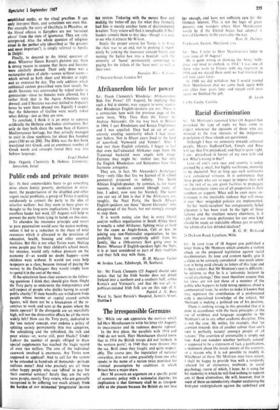Public ends and private means
Sir: In their commendable haste to get something done about family poverty, destitution in retire- ment, the pauperisation of the disabled and other urgent social problems, a group of Tories is seeking assiduously to convert the party to the idea of selective welfare; but they seem to have given no thought to the long-term implications. I hope your excellent leader last week (25 August) will help to prevent the party from tying its hands on this issue..
To abandon the insurance principle and revert to pure paternalism would save the nation nothing, unless it led to a reduction in the share of total resources which is allocated to the provision of education, health, housing and other essential facilities. But this is not what Tories want. Making some people pay for their children's school meals, for instance, would only reduce pressure on the economy if—as would no doubt happen—some children went without. It would not even help taxpayers as a class, because instead of paying the money to the Exchequer they would simply have to spend it in the cost of the meal.
If the selectivists have clear answers to the follow- ing questions I think they should give them. Ought the Tory party to undermine the independence and self-respect of people who dislike having to accept public charity? If state benefits are withdrawn from people whose income or capital exceed certain figures, will there not be a breakdown of the in- centives to work and save at the points where the limits operate? If the disregards are set mercifully high, will not the disincentive effects be all the more widely felt? How can the Tory party, dedicated to the 'one nation' concept, ever endorse a policy of splitting society permanently into two categories, the subsidising and the subsidised, the rich and poor whites—or. worse still, poor blacks? Under Labour the number of people obliged to draw special supplements has reached the tragic record of over two million. The cost of the individual casework involved is enormous. Are Tories now supposed to applaud? And to call for the system' to be extended to hundreds of thousands—perhaps millions more? And who precisely are all these other happy people who can 'afford' to pay for their essential services? Surely they are the very same people, mostly Tory voters, who are generally recognised to be suffering too much already from the burden of our misnamed 'progressive' income
tax system. Tinkering with the money flow and making the better-off pay for what they formerly had free is merely another form of discriminatory taxation. Tory voters will find it inexplicable if their leaders commit them to this idea—though it is easy to see why it attracts Mr Wilson.
Surely the proper course for Tories is to bring the class war to an end, not to prolong it indefi- nitely by junking the insurance concept finally and turning the ballot box into a brantub- with the minority of 'haves' permanently committed to paying for the tickets of the 'have nots' as well as their own.






























 Previous page
Previous page